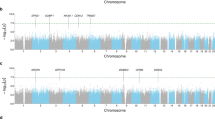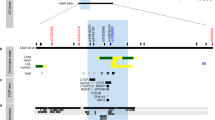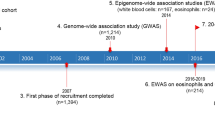Abstract
Asthma is the most common chronic disorder in childhood, and asthma exacerbation is an important cause of childhood morbidity and hospitalization. In the present study, the relationship between single-nucleotide polymorphisms (SNPs) of the ADAM33 gene and asthma in Indian children has been examined using a case–control study. Five SNPs of the ADAM33 gene, F+1(rs511898) G/A, S2 (rs528557) G/C, ST+4 (rs44707) A/C, ST+5 (rs597980) C/T and V4 (rs2787094) C/G, were analyzed in 211 asthma cases and 137 controls aged 1–15 years using the PCR–restriction fragment length polymorphism method. Data were statistically analyzed using the χ2-test and logistic regression model. Haplotype estimation and linkage disequilibrium were conducted using the expectation–maximization algorithm. The genotypes and allele frequencies of SNPs S2 and ST+5 of the ADAM33 gene were significantly associated with asthma risk (P=0.020–<0.001), whereas F+1, ST+4, V4 homozygous mutant genotypes and mutant alleles were significantly associated with increased asthma risk (P=0.031–<0.001). A positive association was also found with haplotypes AGCCT, GGACT and AGCCC (P=<0.001, odds ratio (OR)=6.10–6.50), whereas ACAGT, AGCGC, AGCGT, GCAGC and GCCGT showed protective association with asthma (P=0.019–0.000, OR=0.50–0.20). Taken together, out results suggest that ADAM33 gene polymorphisms may modify individual susceptibility to develop childhood asthma in the Indian population.
Similar content being viewed by others
Log in or create a free account to read this content
Gain free access to this article, as well as selected content from this journal and more on nature.com
or
Accession codes
References
Palmer, L. J. & Cookson, W.O.C.M. Genomic approaches to understanding asthma. Genome Res. 10, 1280–1287 (2002).
Aggarwal, A. N., Chaudhry, K., Chhabra, S. K., D’Souza, G. A., Gupta, D., Jindal, S. K. et al. Prevalence and risk factors for bronchial asthma in Indian adults: a multicentre study. Indian J. Chest Dis. Allied Sci. 48, 13–22 (2006).
Paramesh, H. Epidemiology of asthma in India. Indian J. Pediatr. 69, 309–312 (2002).
ISAAC Steering Committee. Worldwide variations in the prevalence of asthma symptoms: the International Study of Asthma and Allergies in Childhood (ISAAC). Eur. Respir. J 12, 315–335 (1998).
Hoffjan, S. & Ober, C. Present status on the genetic studies of asthma. Curr. Opin. Immunol. 14, 709–717 (2002).
Global strategy for asthma management and prevention. Global Initiative for Asthma (Gina), National Heart, Lung and Blood Institute, US Department of Health and Human Services: National Institute of Health (NIH) Publication No 02-3659 (2005).
Van Eerdewegh, P., Little, R. D., Dupuis, J., Del Mastro, R. G., Falls, K., Simon, J. et al. Association of the ADAM33 gene with asthma and bronchial hyperresponsiveness. Nature 418, 426–430 (2002).
White, J. M. ADAMs: modulators of cell–cell and cell–matrix interactions. Curr. Opin. Cell Biol. 15, 598–606 (2003).
Martin, J., Eynstone, L. V., Davies, M., Williams, J. D. & Steadman, R. The role of ADAM 15 in glomerular mesangial cell migration. J. Biol. Chem. 277, 33683–33689 (2002).
McFarlane, S. Metalloproteases: carving out a role in axon guidance. Neuron 37, 559–562 (2003).
Hundhausen, C., Misztela, D., Berkhout, T. A., Broadway, N., Saftig, P., Reiss, K. et al. The disintegrin-like metalloproteinase ADAM10 is involved in constitutive cleavage of CX3CL1 (fractalkine) and regulates CX3CL1-mediated cell-cell adhesion. Blood 102, 1186–1195 (2003).
Seals, D. F. & Courtneidge, S. A. The ADAMs family of metalloproteases: multidomain proteins with multiple functions. Genes Dev. 17, 7–30 (2003).
Yoshinaka, T., Nishii, K., Yamada, K., Sawada, H., Nishiwaki, E., Smith, K. et al. Identification and characterization of novel mouse and human ADAM33s with potential metalloprotease activity. Gene 282, 227–236 (2002).
Su, D., Zhang, X., Sui, H., Lu, F., Jin, L. & Zhang, J. Association of ADAM33 gene polymorphisms with adult allergic asthma and rhinitis in a Chinese Han population. BMC Med. Genet. 9, 82–87 (2008).
Schneider, S., Roessli, D. & Excoffier, L. Arlequin (version 2.00): software for population genetics data analysis, Genetics and Biometry Laboratory, University of Geneva, Switzerland (2000).
Upadhyay, R., Jain, M., Kumar, S., Ghoshal, U. C. & Mittal, B. Functional polymorphisms of cyclooxygenase-2 (COX-2) gene and risk for esophageal squmaous cell carcinoma. Mutat. Res. 663, 52–59 (2009).
Jongepier, H., Boezen, H. M., Dijkstra, A., Howard, T. D., Vonkz, J. M., Koppelmanz, G. H. et al. Polymorphisms of the ADAM33 gene are associated with accelerated lung function decline in asthma. Clin. Exp. Allergy 34, 757–760 (2004).
Simpson, A., Maniatis, N., Jury, F., Cakebread, J. A., Lowe, L. A., Holgate, S. T. et al. Polymorphisms in a disintegrin and metalloprotease 33 (ADAM33) predict impaired early-life lung function. Am. J. Respir. Crit. Care Med. 172, 55–60 (2005).
Werner, M., Herbon, N., Gohlke, H., Altmüller, J., Knapp, M., Heinrich, J. et al. Asthma is associated with single-nucleotide polymorphisms in ADAM33. Clin. Exp. Allergy 34, 26–31 (2004).
Howard, T. D., Postma, D. S., Jongepier, H., Moore, W. C., Koppelman, G. H., Zheng, S. L. et al. Association of a disintegrin and metalloprotease 33 (ADAM33) gene with asthma in ethnically diverse populations. J. Allergy Clin. Immunol. 112, 717–722 (2003).
Hirota, T., Hasegawa, K., Obara, K., Matsuda, A., Akahoshi, M., Nakashima, K. et al. Association between ADAM33 polymorphisms and adult asthma in the Japanese Population. Clin. Exp. Allergy 36, 884–891 (2006).
Sakagami, T., Jinnai, N., Nakajima, T., Sekigawa, T., Hasegawa, T., Suzuki, E. et al. ADAM33 polymorphisms are associated with aspirin-intolerant asthma in the Japanese population. J. Hum. Genet. 52, 66–72 (2007).
Lind, D. L., Choudhry, S., Ung, N., Ziv, E., Avila, P. C., Salari, K. et al. ADAM33 is not associated with asthma in Puerto Rican or Mexican populations. Am. J. Respir. Crit. Care Med. 168, 1312–1316 (2003).
Raby, B. A., Silverman, E. K., Kwiatkowski, D. J., Lange, C., Lazarus, R. & Weiss, S. T. ADAM33 polymorphisms and phenotype associations in childhood asthma. J. Allergy Clin .Immunol. 113, 1071–1078 (2004).
Lee, J. H., Park, H. S., Park, S. W., Jang, A. S., Uh, S. T., Rhim, T. et al. ADAM33 polymorphism: association with bronchial hyper-responsiveness in Korean asthmatics. Clin. Exp. Allergy 34, 860–865 (2004).
Wang, P., Liu, Q. J., Li, J. S., Li, H. C., Wei, C. H., Guo, C. H. et al. Lack of association between ADAM33 gene and asthma in a Chinese population. Int. J. Immunogenet. 33, 303–306 (2006).
Vergara, C. I., Acevedo, N., Jiménez, S., Martínez, B., Mercado, D., Gusmão, L. et al. A six-SNP haplotype of ADAM33 is associated with asthma in a population of Cartagena, Colombia. Int. Arch. Allergy Immunol. 152, 32–40 (2010).
Schedel, M., Depner, M., Schoen, C., Weiland, S. K., Vogelberg, C., Niggemann, B. et al. The role of polymorphisms in ADAM33, a disintegrin and metalloprotease 33, in childhood asthma and lung function in two German populations. Respir. Res. 7, 91 (2006).
Blakey, J., Halapi, E., Bjornsdottir, U. S., Wheatley, A., Kristinsson, S., Upmanyu, R. et al. Contribution of ADAM33 polymorphisms to the population risk of asthma. Thorax 60, 274–276 (2005).
Postma, D. S. & Howard, T. ADAM33 gene: confirming a gene without linkage. Clin. Exp. Allergy 34, 1–3 (2004).
Kedda, M. A., Duffy, D. L., Bradley, B., O’Hehir, R. E. & Thompson, P. J. ADAM33 haplotypes are associated with asthma in a large Australian population. Eur. J. Hum. Genet. 14, 1027–1036 (2006).
Thongngarm, T., Jameekornrak, A., Limwongse, C., Sangasapaviliya, A., Jirapongsananuruk, O., Assawamakin, A. et al. Association between ADAM33 polymorphisms and asthma in a Thai population. Asian Pac. J. Allergy Immunol. 26, 205–211 (2008).
Noguchi, E., Ohtsuki, Y., Tokunaga, K., Yamaoka-Sageshima, M., Ichikawa, K., Aoki, T. et al. ADAM33 polymorphisms are associated with asthma susceptibility in a Japanese population. Clin. Exp. Allergy 36, 602–608 (2006).
Bijanzadeh, M., Ramachandra, N. B., Mahesh, P. A., Mysore, R. S., Kumar, P., Manjunath, B. S. et al. Association of IL-4 and ADAM33 gene polymorphisms with asthma in an Indian population. Lung 5, 415–422 (2010).
Yang, J., Fan, G. H., Wadzinski, B. E., Sakurai, H. & Richmond, A. Protein phosphatase 2A interacts with and directly dephosphorylates RelA. J. Biol. Chem. 276, 47828–47833 (2001).
Suzuki, A., Yamada, R., Chang, X., Tokuhiro, S., Sawada, T., Suzuki, M. et al. Functional haplotypes of PADI4, encoding citrullinating enzyme peptidylarginine deiminase 4, are associated with rheumatoid arthritis. Nat. Genet. 34, 395–402 (2003).
Acknowledgements
We acknowledge the financial support from the Department of Biotechnology, Government of India (letter no: BT/PR7115/Med/14/955/2006) for carrying out this work. We thank Dr Vikas Mishra for assistance in project designing. We thank all patients and healthy controls for providing blood samples. We thank Ms Rashmi Parihar at the Indian Institute of Technology, Kanpur, for her help with the RFLP analysis.
Author information
Authors and Affiliations
Corresponding author
Additional information
Supplementary Information accompanies the paper on the Journal of Human Genetics website
Supplementary information
Rights and permissions
About this article
Cite this article
Awasthi, S., Tripathi, P., Ganesh, S. et al. Association of ADAM33 gene polymorphisms with asthma in Indian children. J Hum Genet 56, 188–195 (2011). https://doi.org/10.1038/jhg.2010.157
Received:
Revised:
Accepted:
Published:
Issue date:
DOI: https://doi.org/10.1038/jhg.2010.157
Keywords
This article is cited by
-
Association between ADAM33 polymorphisms and asthma risk: a systematic review and meta-analysis
Respiratory Research (2019)
-
Comparative analysis of Adam33 mutations in murine lung cancer cell lines by droplet digital PCR, real-time PCR and Insight Onco™ NGS
Molecular & Cellular Toxicology (2018)
-
T1 polymorphism in a disintegrin and metalloproteinase 33 (ADAM33) gene may contribute to the risk of childhood asthma in Asians
Inflammation Research (2017)
-
Serum 25 Hydroxy Vitamin D Insufficiency Associated with Bronchial Asthma in Lucknow, India
The Indian Journal of Pediatrics (2014)
-
Extracellular matrix remodeling genes polymorphisms and risk of chronic bronchitis and recurrent pneumonia in children
Journal of Human Genetics (2013)



